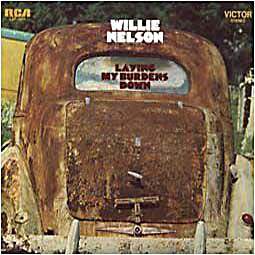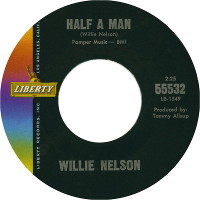
Willie Hugh Nelson is an American singer, songwriter, musician, political activist and actor. He was one of the main figures of outlaw country, a subgenre of country music that developed in the late 1960s as a reaction to the conservative restrictions of the Nashville sound. The critical success of his album Shotgun Willie (1973), combined with the critical and commercial success of Red Headed Stranger (1975) and Stardust (1978), made Nelson one of the most recognized artists in country music. Nelson has acted in over 30 films, co-authored several books, and has been involved in activism for the use of biofuels and the legalization of marijuana.

Red Headed Stranger is the 18th studio album by American outlaw country singer Willie Nelson, released in 1975. Following the success of his recordings with Atlantic Records, coupled with the negotiating skills of his manager, Neil Reshen, Nelson signed a contract with Columbia Records, the label that gave him total creative control over his works. The concept for the album was inspired by the "Tale of the Red Headed Stranger", a song that Nelson used to play as a disc jockey on his program in Fort Worth, Texas. After signing with Columbia, he decided to record the song, and arranged the details during his return to Austin, Texas, from a trip to Colorado. It was recorded at low cost at Autumn Sound Studios in Garland, Texas. The songs featured sparse arrangements, largely limited to Nelson's guitar, piano, and drums. Nelson presented the finished material to Columbia executives, who were dubious about releasing an album that they at first thought was a demo. However, Nelson had creative control, so no further production was added.

Hot Rats is the second solo album by Frank Zappa, released in October 1969. It was Zappa's first recording project after the dissolution of the original version of the Mothers of Invention. Five of the six songs are instrumental; while "Willie the Pimp", features vocals by Captain Beefheart. In his original sleeve notes, Zappa described the album as "a movie for your ears".

Shotgun Willie is the 16th studio album by Willie Nelson, released in 1973. The recording marks a change of style for Nelson, who later stated that the album "cleared his throat". When Nelson refused to sign an early extension of his contract with RCA Records in 1972, the label decided not to release any further recordings. Nelson hired Neil Reshen as his manager, and while Reshen negotiated with RCA, Nelson moved to Austin, Texas, where the ongoing hippie music scene at the Armadillo World Headquarters renewed his musical style. In Nashville, Nelson met producer Jerry Wexler, vice president of Atlantic Records, who was interested in his music. Reshen solved the problems with RCA and signed Nelson with Atlantic Records as their first country music artist.

Crazy: The Demo Sessions is an album by American country musician Willie Nelson. It was released on February 11, 2003, on the Sugar Hill label. These demos were recorded between 1960 and 1966 while Nelson was working as a songwriter for Ray Price's music publishing company in Nashville. 2000 vinyl copies were released On April 20, 2013, as a promotion for Record Store Day.

Wanted! The Outlaws is a compilation album by Waylon Jennings, Willie Nelson, Jessi Colter, and Tompall Glaser, released by RCA Records in 1976. The album consists of previously released material with four new songs. Released to capitalize on the new outlaw country movement, Wanted! The Outlaws earned its place in music history by becoming the first country album to be platinum-certified, reaching sales of one million.

Teatro is the 45th studio album by Willie Nelson, released in September 1998 via Island Records. Filmmaker Wim Wenders produced a documentary feature-length film of the recording sessions and live performances.

Sings Kristofferson is the 23rd studio album recorded by Willie Nelson in 1979 consisting of all covers of Kris Kristofferson songs. It reached #5 on the US Country albums chart, #42 on the US Pop albums charts, and was certified gold in Canada and platinum in the US. The cover is very simple, a single picture of Nelson's face against a black background, with the song titles to the right of his face. The back cover is the same background with both Nelson and Kristofferson's faces together.
Country Willie is a 1975 compilation album by country singer Willie Nelson. It was issued by United Artists Records, the successor label to Liberty Records.

Country Winners is a 1973 compilation album by country singer Willie Nelson.

Yesterday's Wine is the 13th studio album and a concept album by country singer Willie Nelson. Nelson had been recording for RCA Victor since the early 1960s, and had no significant hits. By 1970, his recordings had reached mid-chart positions. Nelson lost the money from his song-writing royalties by financing unsuccessful concert tours that were generally unprofitable. In addition to problems with his music career, Nelson had problems in his personal life. He had divorced his wife, Shirley Collie, and his Tennessee ranch had been destroyed by a fire.

Laying My Burdens Down is the 11th studio album by country singer Willie Nelson, released in the autumn of 1970.

My Own Peculiar Way is the ninth studio album by country singer Willie Nelson. It was his last release in the 1960s. Bergen White was the conductor and arranger. This became Willie's first studio album in which he used his new classical acoustic guitar called Martin N-20 that he named "Trigger".

The Party's Over and Other Great Willie Nelson Songs is the sixth studio album by country singer Willie Nelson.

Country Willie: His Own Songs is the third studio album by country singer Willie Nelson. This was Nelson's third album, his first for RCA Victor.

...And Then I Wrote is the debut studio album by country singer Willie Nelson, recorded during August and September 1962 and released through Liberty Records.

The Best of Willie Nelson is a 1982 compilation album by country singer Willie Nelson.

"Mr. Record Man" is a song written by country music singer-songwriter Willie Nelson. After writing the song, Nelson moved to Houston, Texas, where due to his financial issues, tried to sell it to Larry Butler. Butler, who rejected to buy the song, employed Nelson instead. After his original songs turned into a hits for other artists, Nelson was signed as a recording artist by Liberty Records.

"Half a Man" is a song written and recorded by American country music singer Willie Nelson. The song was released as the A-side of the single for his second Liberty Records album, Here's Willie Nelson. Despite receiving mixed airplay for its content, the song became a sales success, peaking at number twenty-five on Billboard's Hot Country Singles and number twenty on Cashbox's country singles.

"The Part Where I Cry" is a song written by country music singer Willie Nelson. After moving to Nashville in 1960, leveraged by the success of his songwriting, and helped by Harlan Howard, Nelson was signed by Joe Allison of Liberty Records.



















